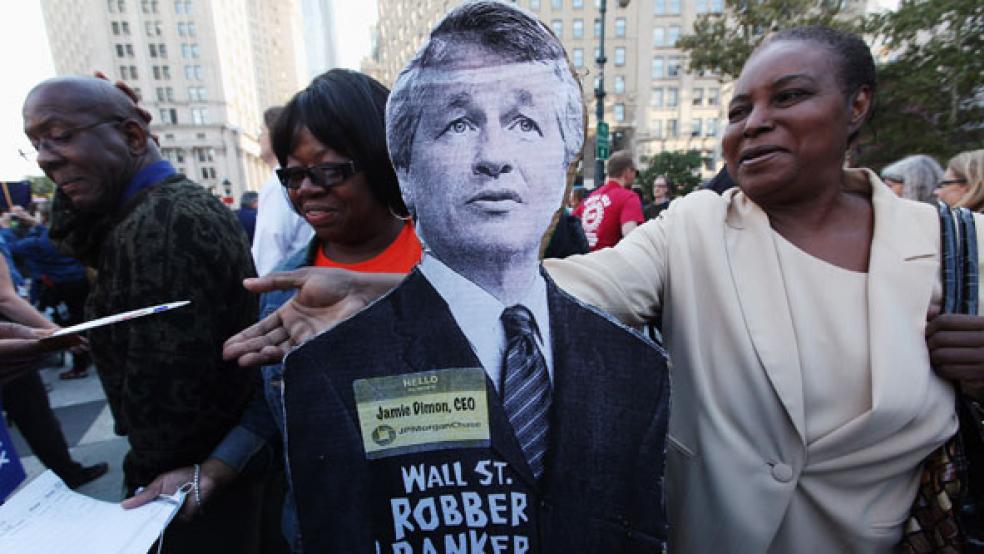Analyst Todd Hagerman of Sterne Agee hit the nail on the head when he identified all the headwinds that JPMorgan Chase (JPM) is going to face in the coming months, ranging from the sluggish global economy to the new regulatory environment and other “structural changes that are affecting most of the bank’s core businesses.”
And maybe he’s right to suggest caution when it comes to loading up on the bank’s stock – Hagerman on Wednesday cut his rating on JPMorgan shares to “neutral” from “buy.” Certainly, it’s true that the JPMorgan’s much-lauded CEO, Jamie Dimon, appears to have a tin ear when it comes to understanding the world beyond Wall Street, having dismissed the financial crisis as just another cyclical downturn and, more recently, shrugging off populist outrage at the behavior of behemoth banks. “I just don't get it," Dimon opined a couple of weeks ago on the Occupy Wall Street movement. "Acting like everyone who's been successful is bad and that everyone who is rich is bad.”
While investing isn’t a popularity contest, there are also some substantive reasons to be wary of the bank. Some of JPMorgan’s decisions have been flawed in recent years: It has forked over north of $1 billion in fines and other payments to settle a raft of regulatory issues ranging from the now-familiar allegations that it failed to fully disclose details on investments to clients to the massive settlement of payola allegations in connection with the municipal financing issues of troubled Jefferson County, Ala.
Deplorable? Sure. But not really that different from any one of the giant financial firms out there. And if you’re comparing it to its peers, JPMorgan looks like a real bargain – a stock that now changes hands for about $33.52 a share, well below the $43.58 at which it began the year. If you’re not going to boycott the financial sector as a matter of general principle, this seems like the stock that you want to own.
True, there will be changes to way financial markets work that make some parts of its business less profitable. But bankers are tremendously creative. If JPMorgan can’t charge customers as much in fees as it used to, rest assured that it will find new kinds of charges to levy. You might prefer to do your banking at a credit union, but when it comes to earning a return (and a not-too-shabby 3 percent yield while you wait), this may be the better way to invest.
JPMorgan also offers relative stability. While several other megabanks fall into the “too big to fail” category, Dimon’s bank is arguably the most diversified and the most experienced in a number of arenas. For instance, after spending much of the decade playing runner-up to investment banks in underwriting stocks and bond issues, JPMorgan now dominates that business with an 8.1 percent share of the $68 billion of investment banking transactions done globally in 2011, according to estimates by Dealogic LLC. (Goldman Sachs, once dominant, could eke out only a 5.8 percent share of that revenue; Wells Fargo has only just broken into the top 10, with a 2.3 percent market share.) JPMorgan also had the single largest market share of the syndicated lending business, 11.2 percent, for 2011.
The days and weeks ahead are likely to be bumpy for JPMorgan. After all, Dimon has publicly acknowledged that the bank has actually increased its lending in Greece, Spain and Portugal. The strategic logic behind this is impeccable – while other banks pull back, often because of their own internal problems, JPMorgan with its stronger balance sheet can go in, cherry-pick loans and build long-term loyalty and market share. But even if this move pays off in the shape of much higher market share, revenues and profits over the long haul, in the more immediate future it also means that the bank’s stock will be battered whenever ugly headlines about the Eurozone appear, as they inevitably will. That is on top of the uncertainties about future trading revenues, and the burden imposed by new regulation, and a slew of other potential issues.
But looking past all the short-term and medium-term sturm und drang, and trying to figure out who the long-term winners will be on the new Wall Street, it’s not hard to see that Dimon’s JPMorgan will be one of them – and its stock can be bought today for seven times trailing earnings.
Of course, given the turmoil in the banking industry at home and abroad – not to mention Dimon’s growing propensity to insert his foot in his mouth – there’s not an insubstantial risk that the stock will remain volatile and see further declines. But those selloffs will just offer investors with an eye to long-term value creation another chance to buy one of a handful of solid businesses that has proven expertise across geographical regions and product areas at an even greater discount. At the very least, what you could make on the bank’s stock will help offset all those nasty extra fees for using your debit card.






